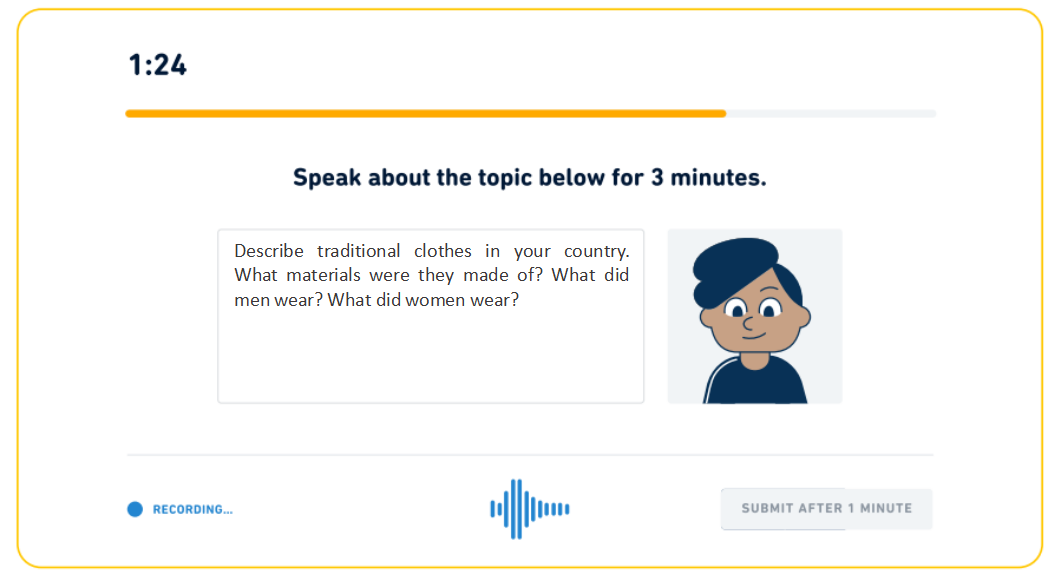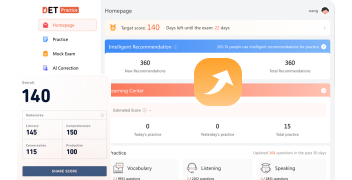Duolingo English Test: 10 Advanced Vocabulary for “Speaking Sample” - Cultural and Historical Topics
This blog post offers 10 advanced vocabulary words tailored for the Duolingo English Test's "Speaking Sample" section. It focuses on cultural and historical topics, providing definitions, examples, and usage tips to help test-takers effectively discuss traditional clothing, cultural heritage, and other relevant themes in their responses.
| Speaking Sample | Technology and Internet |
|---|---|
| Personal Development and Growth | |
| Education and Learning | |
| Opinions and Beliefs | |
| Time and Life Management | |
| Relationships and Social Skills | |
| Hobbies and Interests | |
| Career and Work | |
| Cultural and Historical Topics | |
| Travel and Geography | |
| Health and Wellness | |
| Entertainment and Media | |
| Ethics and Morality | |
| Personal Experiences and Memories | |
| Society and Global Issues |
DET Advanced Vocabulary List and Applications
1. Heirloom
Definition: A valuable object passed down through generations within a family.
Example: The family heirloom symbolizes our heritage and has been cherished for years.
Usage Tip: Discuss the importance of heirlooms in preserving family history.
2. Patrimony
Definition: Cultural heritage or property inherited from ancestors.
Example: Our nation's patrimony includes historic landmarks and traditions that shape our identity.
Usage Tip: Use this term to describe a community's cultural and historical assets.
3. Ritual
Definition: A ceremonial act or series of acts associated with religious or cultural practices.
Example: Many cultures have specific rituals that mark significant life events, such as weddings or funerals.
Usage Tip: Highlight the role of rituals in maintaining cultural traditions.
4. Milestone
Definition: An important event or point in development.
Example: The invention of the printing press was a remarkable milestone in human history.
Usage Tip: Use this term to discuss key achievements in cultural or historical contexts.
5. Pioneer
Definition: A person who is among the first to explore or settle a new area or develop a new idea.
Example: Many pioneers in science and the arts have significantly influenced our understanding of the world.
Usage Tip: Emphasize the contributions of pioneers to cultural advancements.
6. Folklore
Definition: The traditional beliefs, customs, and stories of a community, passed down through generations.
Example: Folklore plays a crucial role in preserving cultural identity and values.
Usage Tip: Discuss how folklore helps us understand a culture's history.
7. Ethnography
Definition: The scientific study of individual cultures through direct observation and participation.
Example: Ethnography offers a deep understanding of how different communities live and interact.
Usage Tip: Use this term to describe research methods in cultural studies.
8. Chronological
Definition: Arranged in the order of time.
Example: A chronological account of events helps us understand the progression of history.
Usage Tip: Discuss how chronological frameworks shape our understanding of historical narratives.
9. Geographical
Definition: Relating to the physical features of the Earth and its atmosphere.
Example: The geographical diversity of a region influences its cultural practices and traditions.
Usage Tip: Highlight the impact of geography on historical development.
10. Civilization
Definition: The stage of human social development and organization that is considered most advanced.
Example: Ancient civilizations laid the groundwork for modern societies through their innovations.
Usage Tip: Use this term to discuss the characteristics of different historical societies.

Sample Answer:
In my country, traditional clothing beautifully reflects our rich heritage and cultural identity. One prominent example is the military-style uniform worn during ceremonial events, which symbolizes national pride and unity. For men, these uniforms are typically made from durable fabrics like wool or high-quality cotton, featuring intricate embroidery that showcases our history and craftsmanship.
Women, on the other hand, often wear a ritual dress that varies by region, crafted from lightweight materials such as linen or silk. These dresses are adorned with colorful patterns and may include folklore motifs, representing local legends or traditions that have been passed down through generations. Both men's and women's outfits are often completed with accessories like belts or handcrafted jewelry, which enhance their cultural significance. Overall, traditional clothing in my country is not only functional but also serves as a testament to our enduring civilization and the values we cherish, making it an essential part of our cultural celebrations.
Further Reading:
DET Prep Course: Speaking Sample Questions
(An article about a comprehensive course and exercises on Speaking Samples.)
10 Advanced Vocabulary for “Writing Sample” in the Duolingo English Test - Personal Experience
(An article about advanced vocabulary for Writing Samples.)
Duolingo English Test: 10 Advanced Vocabulary for “Speaking Sample” - Career and Work
(An article about advanced vocabulary for Speaking Samples.)





